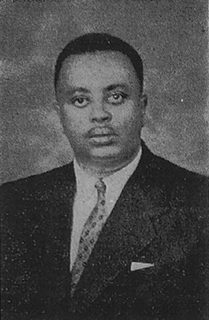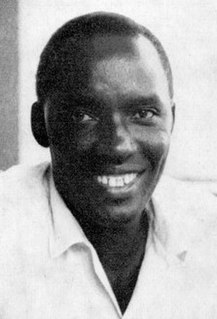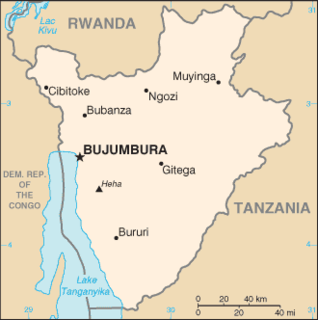 |
|---|
| |
The Party of the People (French : Parti du Peuple, PP) was a Hutu political party in Burundi.
 |
|---|
| |
The Party of the People (French : Parti du Peuple, PP) was a Hutu political party in Burundi.
The PP was established in 1959 following events in neighbouring Rwanda. [1] It contested the 1961 parliamentary elections as part of the Common Front alliance, alongside the Christian Democratic Party, the Democratic and Rural Party, the People's Emancipation Party, the Murundi People's Voice and several other minor parties. [2] The alliance won six seats, of which the PP took four, but was heavily beaten by the Union for National Progress (UPRONA), which won 58 seats. [3] Following UPRONA's victory, party activist Albert Maus committed suicide upon learning the election results. [4] Party member Basile Ntawumenyakarizi was killed in the Kamenge incidents of January 1962, [5] whilst party secretary Jean Ndukwabike was killed later in the year. [6] Several other party members were threatened or beaten, including party president Joachim Baribwegure and Jean Kandeke. [7] [8]
The party contested the 1965 parliamentary elections alone, winning 10 seats in the National Assembly and none in the Senate, whilst UPRONA won 21 seats in the National Assembly and 12 in the Senate.

Louis Rwagasore was a Burundian prince and politician who served as Prime Minister of Burundi from 28 September 1961 until his assassination two weeks later. Born to the Ganwa family of Burundian Mwami Mwambutsa IV in Belgian-administered Ruanda-Urundi in 1932, Rwagasore was educated in Burundian Catholic schools before attending university in Belgium. After he returned to Burundi in the mid-1950s he founded a series of cooperatives to economically empower native Burundians and build up his base of political support. The Belgian administration took over the venture, and as a result of the affair his national profile increased and he became a leading figure of the anti-colonial movement. He soon thereafter became involved with a nationalist political party, the Union for National Progress (UPRONA). He pushed for Burundian independence from Belgian control, national unity, and the institution of a constitutional monarchy. Rwagasore sought to bring UPRONA mass appeal across different regions, ethnicities, and castes, and thus under his leadership the party maintained a leadership balanced between ethnic Hutus and Tutsis, though the latter were usually favoured for more important positions.

Cyprien Ntaryamira was a Burundian politician who served as President of Burundi from 5 February 1994 until his death two months later. A Hutu born in Burundi, Ntaryamira studied there before fleeing to Rwanda to avoid ethnic violence and complete his education. Active in a Burundian student movement, he cofounded the socialist Burundi Workers' Party and earned an agricultural degree. In 1983 he returned to Burundi and worked agricultural jobs, though he was briefly detained as a political prisoner. In 1986 he cofounded the Front for Democracy in Burundi (FRODEBU), and in 1993 FRODEBU won Burundi's general elections. He subsequently became the Minister of Agriculture and Animal Husbandry on 10 July, but in October Tutsi soldiers killed the president and other top officials in an attempted coup.
The Liberal Party of Cuba, was one of the major political parties in Cuba from 1910 until the Cuban Revolution in the late 1950s, when it was exiled.

Elections in Gabon take place within the framework of a presidential multi-party democracy with the Gabonese Democratic Party, in power since independence, as the dominant party. The President and National Assembly are directly elected, whilst the Senate is indirectly elected.
Pierre Ngendandumwe was a Burundian politician. He was a member of the Union for National Progress and was an ethnic Hutu. On 18 June 1963, about a year after Burundi gained independence and amidst efforts to bring about political cooperation between Hutus and the dominant minority Tutsis, Ngendandumwe became Burundi's first Hutu prime minister. He served as prime minister until 6 April 1964 and then became prime minister again on 7 January 1965, serving until his death. Eight days after beginning his second term, he was assassinated by a Rwandan Tutsi refugee.

Parliamentary elections were held in Burundi on 10 May 1965, the first since independence in 1962. Voters elected the National Assembly, which had been reduced from 64 to 33 seats. They followed the assassination of Prime Minister Pierre Ngendandumwe on 15 January 1965, and were won by the ruling Union for National Progress.
Joseph Bamina was a Burundian politician and member of the Union for National Progress (UPRONA) party. Bamina was Prime Minister from 26 January to 30 September 1965, and President of the Senate of Burundi in 1965. He and other leaders of the government were assassinated on 15 December 1965, by Tutsi soldiers during a reprisal effort to stop a coup by Hutu officers.

Léopold Bihumugani or Biha (1919–2003) was a Burundian politician. He was appointed Prime Minister 13 October 1965 following the 10 May 1965 legislative election. He was the personal secretary of Mwami Mwambutsa IV previous to his appointment as Prime Minister. He was Prime Minister until a coup on 8 July 1966 when Prince Charles Ndizeye overthrew his father and became Mwami. Mwami Ntare V installed Michel Micombero to the post of Prime Minister.
André Muhirwa (1920–2003) was a Burundian politician as a member of the Union for National Progress and the third Prime Minister of Burundi from 19 October 1961 to 7 June 1963. His term coincided with Burundi's independence.

Parliamentary elections were held in Burundi on 22 October 1982, the first since 1965. Following a constitutional referendum the year before, the country had become a one-party state with the Union for National Progress (UPRONA) as the sole legal party. The party nominated 104 candidates to contest the 52 seats in the enlarged National Assembly. Following the election, in which turnout was reported to be 95%, President Jean-Baptiste Bagaza appointed a further 13 members.

The Common Front was a political alliance in Burundi.

The Christian Democratic Party was a political alliance in Burundi.

Parliamentary elections were held in Burundi on 29 June 2015. The vote had been initially set for 5 June 2015, alongside local elections, but it was delayed due to unrest. Indirect elections to the Senate occurred on 24 July.
On 18–19 October 1965, a group of ethnic Hutu officers from the Burundian military and gendarmerie attempted to overthrow Burundi's government in a coup d'état. The rebels were frustrated with Burundi's monarch, Mwami Mwambutsa IV, who had repeatedly attempted to cement his control over the government and bypassed parliamentary norms despite Hutu electoral gains. Although the prime minister was shot and wounded, the coup failed due to the intervention of a contingent of troops led by Captain Michel Micombero. The attempted putsch provoked a backlash against Hutus in which thousands of people, including the participants in the coup, were killed. The coup also facilitated a militant Tutsi backlash against the monarchy resulting in two further coups which culminated in the abolition of the monarchy in November 1966 and the proclamation of a republic with Micombero as President of Burundi.

On 21 October 1993, a coup was attempted in Burundi by a Tutsi–dominated army faction. The coup attempt resulted in assassination of Hutu President Melchior Ndadaye and the deaths of other officials in the constitutional line of presidential succession. François Ngeze was presented as the new President of Burundi by the army, but the coup failed under domestic and international pressure, leaving Prime Minister Sylvie Kinigi in charge of the government.

Paul Mirerekano was a Burundian politician. Ethnically Hutu, he worked as an agronomist for the Belgian colonial administration in Ruanda-Urundi before starting a successful market garden in Bugarama. Politically, he was a nationalist, monarchist, and advocate for Hutu civil rights. He was a leading member of Louis Rwagasore's political party, the Union for National Progress (UPRONA), and in 1961 served as the organisation's interim president. Rwagasore's assassination in 1961 fueled a rivalry between Mirerekano and Prime Minister André Muhirwa, as both men claimed to be the heirs to Rwagasore's legacy and sought to take control of UPRONA. The controversy led to the coalescing of two factions in the party, with Mirerekano leading what became known as the Hutu-dominated "Monrovia group". His criticism of Muhirwa and his successor led him to be arrested on several occasions, but in 1965 he was elected to a seat in the National Assembly representing the Bujumbura constituency. The body subsequently elected Mirerekano its First Vice-President on 20 July. In October Hutu soldiers launched a coup attempt which failed, but led to the outbreak of ethnic violence. The government believed Mirerekano helped plan the coup attempt and executed him. His reputation remains a controversial subject in Burundi.

Joseph Biroli-Baranyanka was a Burundian politician and was the first Burundian to receive a university education. Born in 1929 to a prominent chief, he was a Ganwa of the Batare clan. He performed well as a student and earned a diploma from the Institut universitaire des Territoires d'Outre-Mer in 1953. After continuing his education at several other universities he took up work for the European Economic Community. In 1960 his brother, Jean-Baptiste Ntidendereza, co-founded the Christian Democratic Party, and Biroli became the party's president. His main political rival was Prince Louis Rwagasore, a Ganwa of the Bezi clan who led the Union for National Progress. Biroli was friendly to the Belgian colonial administration in Ruanda-Urundi, while UPRONA demanded immediate independence.
Jean-Baptiste Ntidendereza was a Burundian politician. A co-founder of the Christian Democratic Party, he served as Minister of Interior of Burundi in 1961. He was later convicted of conspiring to kill Louis Rwagasore, a political opponent, and publicly executed.
Thaddée Siryuyumunsi was a Burundian politician who served as President of the National Assembly from 1961 to 1965.
The Kamenge incidents or Kamenge riots were a series of armed raids and murders conducted in the Kamenge quarter of Bujumbura, Burundi in January 1962.